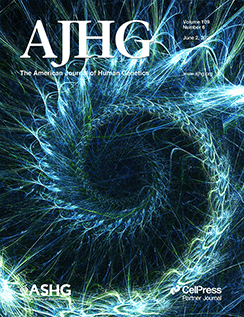通过在不同人群中使用多基因风险评分来探索抑郁症治疗反应
IF 8.1
1区 生物学
Q1 GENETICS & HEREDITY
引用次数: 0
摘要
难治性抑郁症(TRD),通常定义为对至少两种抗抑郁药物的反应有限或无反应,发生在大约三分之一的重度抑郁症(MDD)患者身上。对欧洲血统个体的研究强调了TRD和MDD之间的基因重叠。我们分析了UCLA ATLAS社区健康研究(ATLAS)和我们所有人研究计划(AoU)两个大型和多样化的生物库,以测试重度抑郁症(MDD-PGS)和TRD的多基因评分之间的关联。与治疗应答者相比,TRD个体在所有祖先中都有更高的MDD-PGS。在两个生物库中,MDD-PGS与欧洲和西班牙/拉丁美洲遗传祖先个体对选择性血清素再摄取抑制剂的反应显著相关。在AoU中,观察到欧裔美国人对三环类药物或血清素调节剂的反应,以及非洲裔美国人对血清素和去甲肾上腺素再摄取抑制剂的反应,MDD-PGS下降。ATLAS发现MDD-PGS对非典型药物的应答率低于TRD对西班牙/拉丁美洲mdd患者的应答率,MDD-PGS与非典型药物相关。总的来说,通过利用来自两个不同生物库的更大样本量,我们为不同遗传祖先个体的抗抑郁反应和治疗特异性提供了新的见解。本文章由计算机程序翻译,如有差异,请以英文原文为准。
Exploring depression treatment response by using polygenic risk scoring across diverse populations
Treatment-resistant depression (TRD), usually defined as limited or no response to at least two antidepressants, occurs in approximately one-third of individuals diagnosed with major depressive disorder (MDD). Studies of individuals of European ancestry highlight a genetic overlap between TRD and MDD. We analyzed two large and diverse biobanks, the UCLA ATLAS Community Health Study (ATLAS) and the All of Us Research Program (AoU), to test for associations between a polygenic score for major depression (MDD-PGS) and TRD. Compared to treatment responders, TRD individuals have higher MDD-PGS across all ancestries. MDD-PGS was significantly associated with response to selective serotonin reuptake inhibitors in individuals of European and Hispanic/Latin American genetic ancestries in both biobanks. In AoU, a decreased MDD-PGS was observed in response to tricyclics or serotonin modulators in individuals of European American ancestry and in response to serotonin and norepinephrine reuptake inhibitors in individuals of African American ancestry. ATLAS found that MDD-PGS showed lower odds of responding to atypical agents than did TRD in MDD-affected individuals belonging to the Hispanic/Latin American group, MDD-PGS was associated with atypical agents. Overall, by leveraging larger sample sizes from two diverse biobanks, we provide new insights into antidepressant response and treatment specificity for MDD in individuals of diverse genetic ancestries.
求助全文
通过发布文献求助,成功后即可免费获取论文全文。
去求助
来源期刊
CiteScore
14.70
自引率
4.10%
发文量
185
审稿时长
1 months
期刊介绍:
The American Journal of Human Genetics (AJHG) is a monthly journal published by Cell Press, chosen by The American Society of Human Genetics (ASHG) as its premier publication starting from January 2008. AJHG represents Cell Press's first society-owned journal, and both ASHG and Cell Press anticipate significant synergies between AJHG content and that of other Cell Press titles.

 求助内容:
求助内容: 应助结果提醒方式:
应助结果提醒方式:


